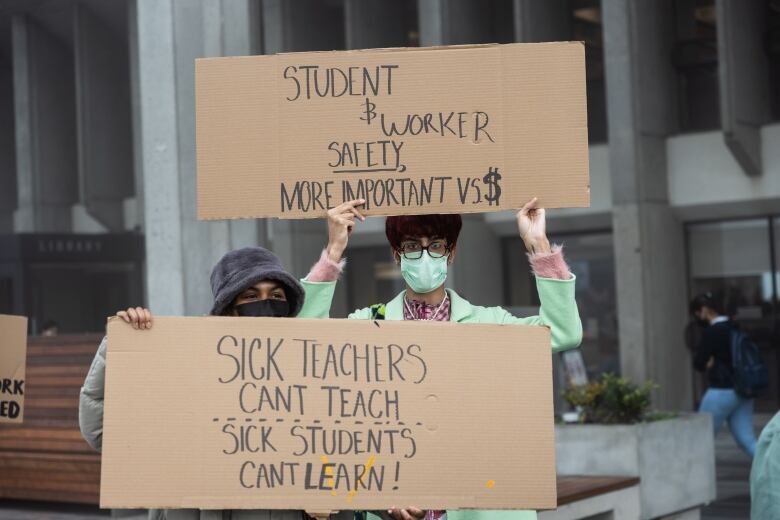SFU faculty members' names appear on student petition they never signed, school confirms
Petition calls on university to continue distance education as Omicron circulates

Professor Robert Gordon says he never signed a petition against a return to in-class learning at Simon Fraser University (SFU) and yet somehow, his name shows up on a list of people who did.
Gordon, a criminology professor, is one of multiple faculty members who say their name fraudulently appears on a list of signatories to an online petition demanding the school continue distance learning while the COVID-19 Omicron variant circulates.
The petition, hosted on Change.org, coincided with a Jan. 24 student walk-out event on the school's Burnaby campus protesting the decision to resume in-person classes after a prolonged winter break.
Created by an anonymous person or group, the petition's author is identified only as "SFU students" and the signature tally, as of Tuesday morning, is at 4,752 of its stated goal of 5,000 signatures.
According to the university, a Simon Fraser Student Society (SFSS) staff member shared the petition, along with the list of signatories' names, with school administration last week.
In an email, a university spokesperson said that was when "several faculty and staff" noticed their signatures were listed when they had not signed it.
"There I was in all my glory on this particular list, and I most certainly had not given anybody permission to add me," said Gordon.
"And from what I understand from my colleagues who were also on the list — an enormous number of them transcending at least two or three departments — that they had not been approached either, that their names had just appeared," he added.

Corbett Gildersleve, the acting president of the SFSS, told CBC via email the society was not involved in the petition's creation and is not responsible for any fraudulent activity that may have taken place.
"We have not issued an apology since we did not have any involvement in its creation," said Gildersleve in an email.
Finding out who is behind the alleged cut-and-paste job is a challenge.
According to Daniela Ponce, communications director for Change.org Canada, only petition organizers have the ability to see and download the list of signatures.
Ponce says anyone who thinks they have been impersonated should contact the company directly. This can be done by scrolling to the bottom of the petition page, below user comments, to a link where people can report a policy violation.
"We take complaints of impersonation very seriously," said Ponce via email.

Gordon actually favours a return to in-class learning but said he understands students' concerns about Omicron and says the fraud is unfortunate.
"It's a dark thing for whoever was advocating for this to have done because it undermined that. But there's little that we can do about it at this point," said Gordon.
Maaike Helmus, an associate professor in the criminology department, said in an email she does support extending distance learning but didn't sign the petition because she thought it was for students only.
"I think it's a shame that someone chose unethical practices to boost the number of signatories — it discredits the whole activity," said Helmus in an email.
Helmus doesn't know yet if her name was falsely added.
Brian Green, the executive director of the SFU Faculty Association, confirmed both administrators and faculty members brought the issue of fraudulent signatures to the association's attention.
"There is little we can do concretely ... but we certainly have serious concerns about actions that target our members for misrepresentation," said Green in a statement.
Gordon hopes the school does take concrete action of some kind.
"There needs to be a prompt response from the public university ... they need to make inquiries into this."